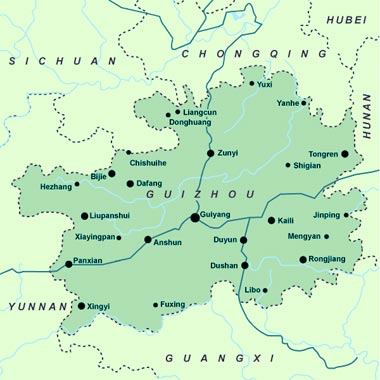Guizhou Province is also called Qin or Gui. It has beautiful mountains, rivers, pleasant weather and rich resources. It belongs to a multinational inland province.
Guizhou Province is situated at the Yunnan-Guizhou Plateau with the east longitude 103°36 ' ~ 109°35 ‘ and the north latitude 24°37 ' ~29°13 '. To the east is Hunan province; to the south is Guangxi province; to the west is Yunnan Province; and to the north is Sichuan Province and Chongqing. The total area of the province occupies 176,100 square kilometers. From east to west, it spans about 595 kilometers; from south to north, it spans about 509 kilometers. All these area are called Guizhou Plateau. 87% of them are mountains; 10% of them are hilly; 3% of them are basins and valleys plain. The average elevation is 1,100 meters.
Guizhou Climate
Guizhou's average annual rainfall ranges from 100 to 130 cm. The perennial relative humidity is over 70% and the frost-free period lasts about 270 days. The climate here is moist. It belongs to the humid subtropics monsoon climatic region. The temperature changes slightly. It’s really pleasant that the weather is often warm in winter and cool in summer. However, the climate is unstable. The local people always say, “There is different weather only within ten miles”. Moreover, different types of disastrous weather sometimes occur, including drought, the autumn wind, and hail. They all do harm to agricultural productivity.
Guizhou Province Minorities
Guizhou is a multinational province. The entire province has 49 nations which is only inferior to Yunnan and Xinjiang Province. So it’s the third province that contains the largest number of minorities in China. The minorities include Miao (苗), Buyi (布依), Dong (侗), Tujia (土家), Yi (彝), Gelao (仡佬), Shui (水), Hui (回), Yao (瑶), Zhuang (壮), Maonan (毛南), Mongolian (蒙古), Mulam (仫佬), Qiang (羌), Manchu (满) and so on. The population of the national minorities account for 37.9% of the entire province.

Guizhou Specialty
Maotai wine (茅台酒) is called “state liquor”, which is produced in Maotai Town of Renbei County in Guizhou Province. In 1915, it was rated the second largest liquor in the world in Panama International Exposition. The special mellow fragrance attracts many wine drinkers. Now its fame is known at home and abroad.
Yunwu Tea (云雾茶) is called Niaowang (the king of birds) Tea. In the early days of Yuan, during Ming and Qing Dynasty, it had become the royal tribute. Cooking ducks, pigs, cattle and bean curds are well-known in Guizhou. It stresses on “extremely spicy foods ”. Many characteristic dishes must add some peppers, such as spicy crispy-skin fish (麻辣脆皮鱼), Dushan eel (独山盐酸膳片), Tianma pigeons (天麻鸳鸯鸽) and Kungpo chicken (宫保鸡丁).
Guizhou Entertainment
Colorful folk dramas have had a long history in Guizhou province. In the Chinese region, Qian play (黔戏), Qian show (黔剧), a lantern show (花灯戏) and Di play (地戏) are very popular. In the minority national region, Dong opera (侗戏) and Buyi drama (布依戏) are also popular. Qian play is called Guizhou Bangzi (梆子) with local flavor. Qian opera is developed from Guizhou Tanci (弹词). The lantern show is also called “Light Opera”, which is developed from folk songs and dances.
Di play is known as “Tiaoshen” (the dance to the God). It’s widely circulated in some areas of Guizhou Province. Especially it is concentrated in the region of Anshun area. Why do the farmers enjoy it so much? The reason is that they want to dispel the evil in that way. This is a superstition, but it’s also an entertainment. According to the farmers, dancing to the God in the beginning of one year can keep the farmers safe and healthy and have a good harvest.
>> Guizhou Tour Scenic Spots |